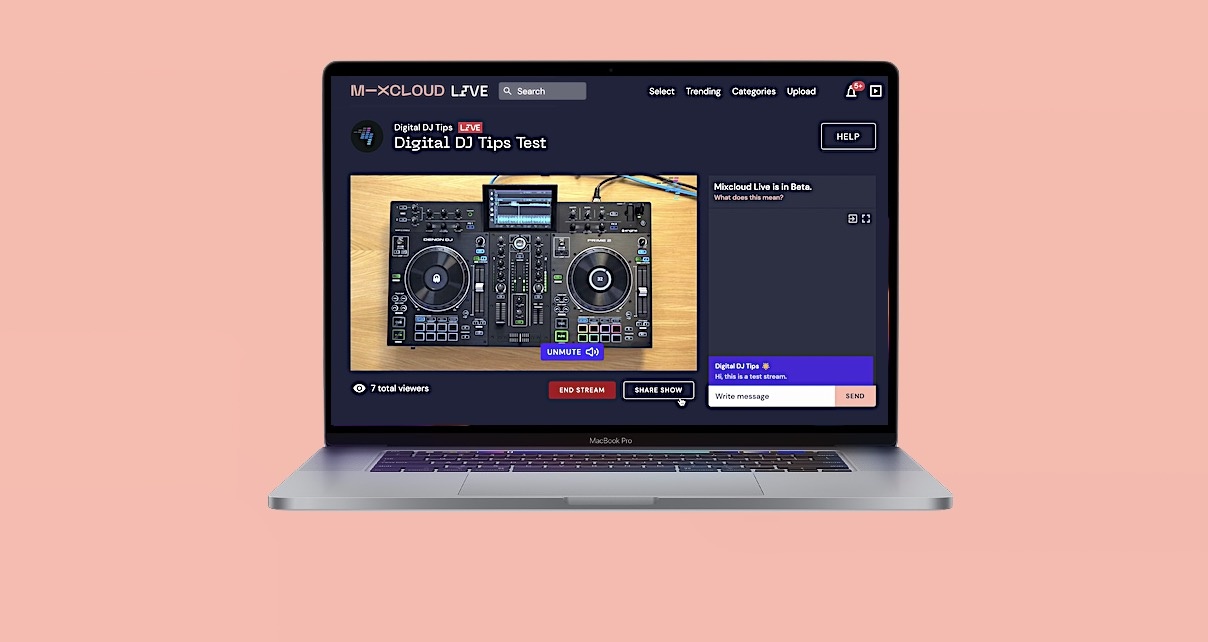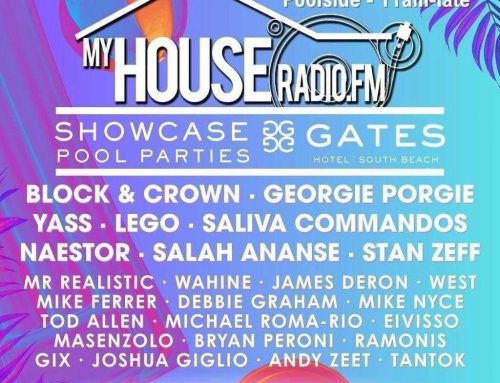
Want to know how to Livestream your next DJ set 100% legally, using Mixcloud’s new Mixcloud Live feature? Read on
As we announced in this news piece, Mixcloud Live, from the DJ-focused radio platform Mixcloud, is the first service for a long time to offer 100% legal streaming for DJs. At least, it’s the first platform with any recognition in the world of DJing to do so. No copyright takedowns, no removal from the platform, no muting.
And the timing couldn’t be better – indeed, Mixcloud has rushed this beta release due to the huge demand and the frustrations DJs are feeling with trying and largely failing to livestream on Facebook, Instagram, YouTube and so on.
(For the record, by the way, the first platform to do this was called chew.tv, which was bought by Bandlab, but then things went very quiet. Last I heard, Bandlab had closed down chew.tv’s servers. There was next to no DJ activity there based on our investigations last week, Bandlab now being very much aimed at traditional musicians.)
So the questions are, how to do it? And indeed, should you be making the effort at all?
Pros and cons of streaming on Mixcloud Live – read first
Firstly, you should know that it isn’t free – you need to be a Select member which you can do by joining MixCloud Pro. However, the fee of £9 a month is currently waived for the first three months, so this isn’t really an issue right now.
Secondly, unless you’ve already built a big audience for yourself on Mixcloud, you may find yourself broadcasting to, well, nobody. Mixcloud is not like Facebook or Instagram (you know, you go live, a “general” audience of followers ends up stumbling over your Livestream, they happily share it to their friends, and the result is a nice big watch party for your stream… till it gets wiped).
Basically, on Mixcloud YOU have to do some real promotion to get people to your stream. That could involve going to the other platforms and asking people to come across, but it’s an extra step for them to do that. Ultimately, succeeding on Mixcloud will involve showing commitment to Mixcloud. People who do that (and of course, bigger DJs, labels and so on, who an audience will follow wherever they choose to stream), are likely to succeed here.
And finally, right now, your live streams are not archived – they happen, then they’re gone. If you want to archive them, you should make sure you record them locally, too.
However, one BIG plus point is the ability to monetize your streams, which is coming soon – and oh, did we mention this is LEGAL? We reckon now is the time to show some support and get on Mixcloud Live!
Convinced? OK, let’s find out. (Spoiler: If you’ve done this before on other platforms, it’s really simple. If not, you’re going to have to learn all the ins and outs of live-streaming. Don’t worry – we’ll link to resources below.)
How to stream 100% legally on Mixcloud Live
Mixcloud has a rather skeleton-like document on how to do this that they will no doubt add to over time – but for now, we’ve outlined the basics below and in the video above (here’s another link to it), and included lots of extra advice, tips and resources to make it easier for you.
What you’ll need:
- A Mixcloud Pro subscription – currently free for 90 days (sign up here)
- Broadcast software – usually on a laptop, where you can use OBS (free), Ecamm Live (our favorite), XSplit, Streamlabs OBS, vMix, Lightstream, but there are also broadcast apps for phones and tablets. Anything that can broadcast using “RTMP” will work. We expect Mixcloud will build this directly into its own apps in good time, too
- A stream key from Mixcloud – go to https://www.mixcloud.com/live/new, name your stream, and you’ll be give a stream key and server name (the server name doesn’t change, it’ll be “rtmp://rtmp.mixcloud.com/broadcast”)
How to go live:

- Set up your cameras, audio etc as you would to livestream anywhere. Need help? Take a look at How To Livestream DJ Sets: 4 Ways To Do It From Anywhere, a d to improve the quality of your output, look at Which Camera Is Best For DJ Set Livestreaming? for awesome video, and 2 Ways To Get Great Sounding Audio On Your DJ Livestreams for the all-important audio
- Click Start Streaming in your streaming software. The Mixcloud page you are already on will change to show your stream. Don’t worry, nobody else can see it yet – it’s a preview. Check all looks and sounds good, and make any tweaks
- Get the link to share on social for your fans to come over to the livestream – Click the “Share Show” button to copy the link, head over to your socials, and get publicising…
- Click the Send Your Broadcast Live button to actually go live – Mixcloud will inform your actual followers on its own platform that you’re live
- Introduce your livestream using Mixcloud’s chat function – a message posted right at the start telling people what you’re doing is polite, and will help people stumbling across the stream to understand what type of stream they’ve found
- Play away! – We’ve got two awesome resources on how to make sure your livestreams go down a storm. Check out 10 Livestream DJ Set Mistakes You Should Stop Making Immediately and 5 Things I Learned Livestreaming A DJ Set From My Balcony.
Final tip: If you want to stream to other services AND Mixcloud, you can use restream.io: You send a single stream to the service, and it relays your livestream on to your chosen services. Mixcloud’s RTMP key and server details can be added to a custom RTMP destination in restream.io, although you will have to pay to do so.
Finally…
Being able to DJ livestream legally really trumps everything here. As a community, we have to get behind Mixcloud as things stand, because the company has got our back in a way nobody else has. Give it a go – and let us know any questions, or how you get on, below.





Leave A Comment
You must be logged in to post a comment.